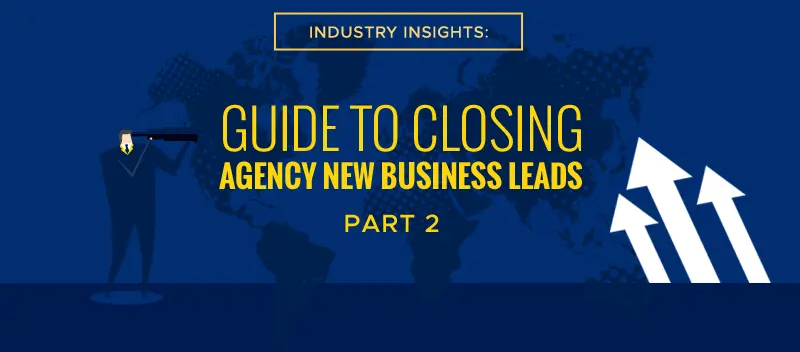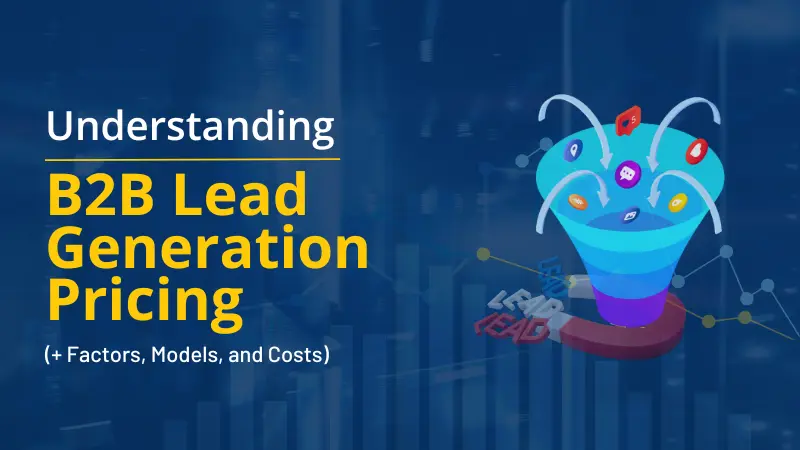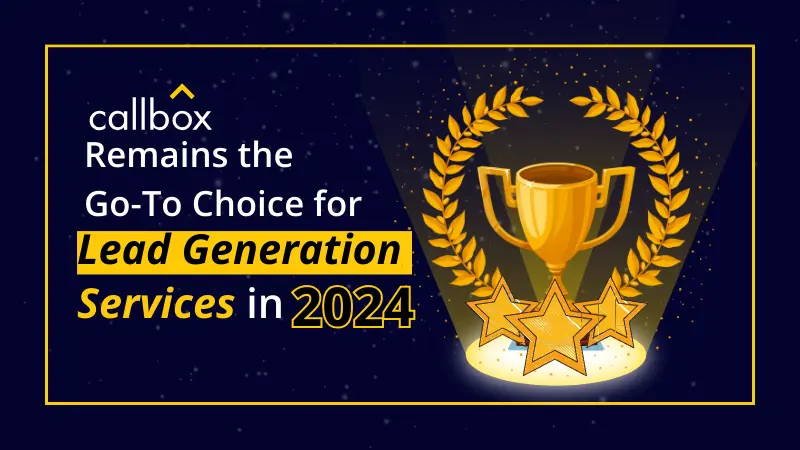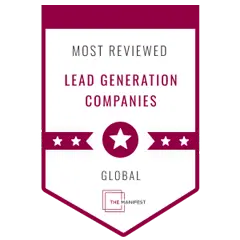Is it time to say RIP to the RFI? A recent Adage article says probably yes. The agency selection process is undergoing a major overhaul and, more crucially, the things that brands look for in a pitch are changing, too.
In part 1 of this series, we look at industry trends that shape the way ad agencies connect and generate leads. All signs indicate that it’s a noisier and more crowded marketing landscape out there and that agencies need to step up their game to capture their prospects’ thinly spread attention.
But, as you may very well know, being able to tap into a steady stream of leads doesn’t necessarily mean it’s going to be smooth sailing ahead for your client acquisition efforts. You still face the difficult task of turning these opportunities into accounts.
In today’s post, we’ll focus on one of the most critical items in the agency selection process: the agency’s new business pitch.
Although they may not realize it yet, many agencies need to carefully rethink the way they approach pitching. As we’ll find out below, research suggests that the factors which shape a winning pitch aren’t exactly what most people in the industry typically expect.
Why Your Old Agency New Business Pitch Won’t Cut It Anymore
According to the adage article we referenced earlier, the agency pitch process has gotten shorter, faster, and better. Pragmatic conversations trump flashy presentations as the biggest factor that helps agencies win new business.
What Brands Value in a Pitch and Why
As brands start to put more emphasis on substance over form when evaluating pitches, they’re digging deeper into candidate agencies during the selection process. Many advertisers prefer to meet the team who’s going to actually do the campaign (instead of speaking only with hand-picked senior agency people), while a number of agencies prioritize a team’s problem-solving capabilities (giving lesser importance to the quality of spec work).
The shift away from the drawn-out pitch process largely stems from two key developments: marketers’ insatiable demand for content, and advertisers’ move toward project-based work. These create situations in the agency screening process where brands evaluate candidates based on speed and consistency, prompting agencies to streamline and shorten their pitch activities.
How This Plays Out in the Numbers
Recent industry trends bear this out. Statistics compiled by BarnRaisers show that:
- 53% of clients evaluate at least 7 agencies for preliminary review.
- The average closing rate of agency new business pitches is 43%.
- Best-in-class agencies close 85% of new business pitches and are 6 times more active in pitching than the rest.
- Executives select an agency based on “chemistry” (96%), differentiation (82%), confident/articulate team (61%), passion for the client’s business (39%), and brilliant creative (33%).
- 50% of executives suggest agencies need to develop a new culture.
But most agencies have yet to realign their new business pitch with these changes:
- 66% of agencies neither have a plan nor follow a methodology for winning new business pitches.
- 47% of ad agency professionals are dissatisfied with how their agency handles new business pitches.
- 41% of clients are not happy with their current agency’s strategy and thinking; they cite lack of proactivity (40%), unsatisfactory creative (39%), and search for new ideas (33%) as their agency’s biggest weaknesses.
Related: The B2B Buying Process Has Changed: Here’s How Not to Get Left Behind
How to Craft a Winning Agency New Business Pitch (According to Research)
Earlier this year, content intelligence company Vennli polled 200 U.S-based professionals who worked either for agencies or for in-house marketing departments. The following tips and best practices on crafting a winning agency new business pitch are based on the Vennli study’s findings.
1. Use concrete data to show revenue impact
We all know that the plural of anecdote isn’t data. While anecdotes about how your agency can boost a brand’s revenues may help your narrative, it’s solid data that wins deals. In-house marketers want to work with data-driven agencies since in-house marketers themselves need data to justify and measure their own marketing decisions.
Vennli’s survey finds that agencies that demonstrate their data-driven capabilities during the pitch process tend to win more deals:
- 89% of agencies that reported win rates of more than 50% typically carry out primary research when creating a pitch.
- 64% of agencies with win rates of below 40% conduct primary research when pitching.
When asked about why being data-driven matters to in-house marketers during the pitch evaluation process, the respondents said:
- The biggest pitching mistake that agencies make is not showing how they plan to back up their claims to increase revenues.
- A data-driven agency enables in-house marketers to prove positive ROI.
- Agencies that value quantitative insights tend to work with high-quality clients.
Related: How to Write a Compelling Case Study
2. Rethink the client’s entire strategy
In-house marketers say the types of insights they’re looking for can’t be found in generic and inflexible pitches. In-house marketers don’t just want to find out what an agency can do; they want a new way of seeing their marketing situation. Agency pitches that deliver a fresh set of ideas for the company tend to do better than others.
While both well-performing and poorly-performing agency pitches involve some degree of rethinking the client’s strategy, top-notch pitches are more likely to rely on this approach as a differentiating factor:
- 41% of agency pitches with win rates of more than 50% report rethinking the client’s entire strategy as “extremely influential”.
- 23% of pitches with win rates below 40% cite strategic rethink as a crucial factor.
In addition, there appears to be a gap between how much importance agencies and in-house marketers place on brand recognition’s role in influencing win rates, suggesting that there are more critical drivers at play than an agency’s reputation alone.
- 34% of agencies believe their reputation helps them win deals, while only 15% of in-house marketers think this is the case.
- 42% of in-house marketers say high value for cost determines which agency they choose, but only 13% of agencies think so.
3. Know the client inside-out
In the Vennli poll, in-house marketers want agencies to review what their organization really needs and then tailor the pitch based on this information. That means agencies must take the time and effort to build a client profile for each prospect they’re trying to win. At the bare minimum, the profile should cover the client’s:
- Mission
- Strengths and Weaknesses
- Competitors and Competitive Position
- Target Audience
In-house marketers particularly look for competitive research and insight in an agency pitch. They think that agencies which thoroughly become familiar with a client’s competition tend to deliver better results.
- 82% of in-house marketers expect agencies to carry out competitive research as part of the pitch, but only 56% of agencies actually do this.
- 60% of agencies with win rates above 50% research the client’s competition, while only 44% of agencies with win rates below 40% carry out competitive research.
Related: How to Use the 3 Levels of Pain Points for Better Sales Conversations
4. Don’t pitch; just consult
You already know that in-house marketers deal with salespeople all the time. They’re already very familiar with (and quite possibly tired of) pitches that try to rush a close. To differentiate your agency new business pitch, offer a solution instead of aiming for a sale.
Potential clients want agencies that act as consultants who can share their specific expertise:
- 49% of marketers rank the ability to be flexible and adapt to change as one of their top three agency selection criteria.
- 41% of in-house marketers also place subject matter/industry-specific expertise in their top three considerations.
- 48% of agencies credit won deals to their industry-specific experience.
The Takeaway: Unless you take the time and effort to refine your agency new business pitch to meet the demands of today’s in-house marketers, Your offer won’t have a decent chance of turning into a deal. Pay close attention to the industry trends we’ve highlighted in this blog post and apply these insights on your next pitch.
Related: A B2B Guide to Winning New Customers and Repeat Business [INFOGRAPHIC]











